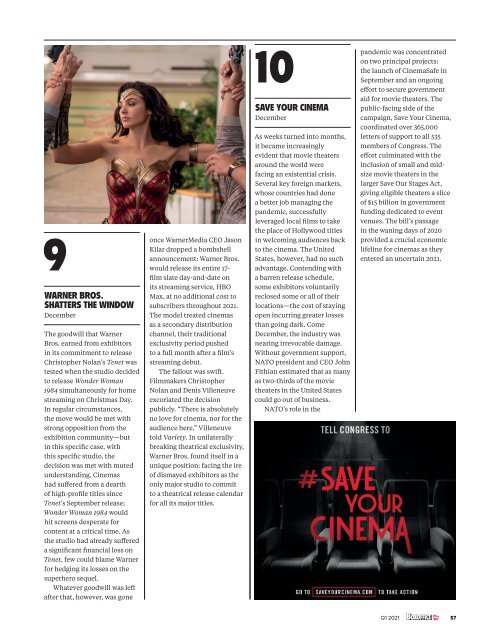Boxoffice Pro Q1 2021
Boxoffice Pro is the official publication of the National Association of Theatre Owners.
Boxoffice Pro is the official publication of the National Association of Theatre Owners.
Create successful ePaper yourself
Turn your PDF publications into a flip-book with our unique Google optimized e-Paper software.
9<br />
WARNER BROS.<br />
SHATTERS THE WINDOW<br />
December<br />
The goodwill that Warner<br />
Bros. earned from exhibitors<br />
in its commitment to release<br />
Christopher Nolan’s Tenet was<br />
tested when the studio decided<br />
to release Wonder Woman<br />
1984 simultaneously for home<br />
streaming on Christmas Day.<br />
In regular circumstances,<br />
the move would be met with<br />
strong opposition from the<br />
exhibition community—but<br />
in this specific case, with<br />
this specific studio, the<br />
decision was met with muted<br />
understanding. Cinemas<br />
had suffered from a dearth<br />
of high-profile titles since<br />
Tenet’s September release;<br />
Wonder Woman 1984 would<br />
hit screens desperate for<br />
content at a critical time. As<br />
the studio had already suffered<br />
a significant financial loss on<br />
Tenet, few could blame Warner<br />
for hedging its losses on the<br />
superhero sequel.<br />
Whatever goodwill was left<br />
after that, however, was gone<br />
once WarnerMedia CEO Jason<br />
Kilar dropped a bombshell<br />
announcement: Warner Bros.<br />
would release its entire 17-<br />
film slate day-and-date on<br />
its streaming service, HBO<br />
Max, at no additional cost to<br />
subscribers throughout <strong>2021</strong>.<br />
The model treated cinemas<br />
as a secondary distribution<br />
channel, their traditional<br />
exclusivity period pushed<br />
to a full month after a film’s<br />
streaming debut.<br />
The fallout was swift.<br />
Filmmakers Christopher<br />
Nolan and Denis Villeneuve<br />
excoriated the decision<br />
publicly. “There is absolutely<br />
no love for cinema, nor for the<br />
audience here,” Villeneuve<br />
told Variety. In unilaterally<br />
breaking theatrical exclusivity,<br />
Warner Bros. found itself in a<br />
unique position: facing the ire<br />
of dismayed exhibitors as the<br />
only major studio to commit<br />
to a theatrical release calendar<br />
for all its major titles.<br />
10<br />
SAVE YOUR CINEMA<br />
December<br />
As weeks turned into months,<br />
it became increasingly<br />
evident that movie theaters<br />
around the world were<br />
facing an existential crisis.<br />
Several key foreign markets,<br />
whose countries had done<br />
a better job managing the<br />
pandemic, successfully<br />
leveraged local films to take<br />
the place of Hollywood titles<br />
in welcoming audiences back<br />
to the cinema. The United<br />
States, however, had no such<br />
advantage. Contending with<br />
a barren release schedule,<br />
some exhibitors voluntarily<br />
reclosed some or all of their<br />
locations—the cost of staying<br />
open incurring greater losses<br />
than going dark. Come<br />
December, the industry was<br />
nearing irrevocable damage.<br />
Without government support,<br />
NATO president and CEO John<br />
Fithian estimated that as many<br />
as two-thirds of the movie<br />
theaters in the United States<br />
could go out of business.<br />
NATO’s role in the<br />
pandemic was concentrated<br />
on two principal projects:<br />
the launch of CinemaSafe in<br />
September and an ongoing<br />
effort to secure government<br />
aid for movie theaters. The<br />
public-facing side of the<br />
campaign, Save Your Cinema,<br />
coordinated over 365,000<br />
letters of support to all 535<br />
members of Congress. The<br />
effort culminated with the<br />
inclusion of small and midsize<br />
movie theaters in the<br />
larger Save Our Stages Act,<br />
giving eligible theaters a slice<br />
of $15 billion in government<br />
funding dedicated to event<br />
venues. The bill’s passage<br />
in the waning days of 2020<br />
provided a crucial economic<br />
lifeline for cinemas as they<br />
entered an uncertain <strong>2021</strong>.<br />
<strong>Q1</strong> <strong>2021</strong><br />
57<br />
48-61_Top-10-Moments.indd 57 12/02/<strong>2021</strong> 12:33

















